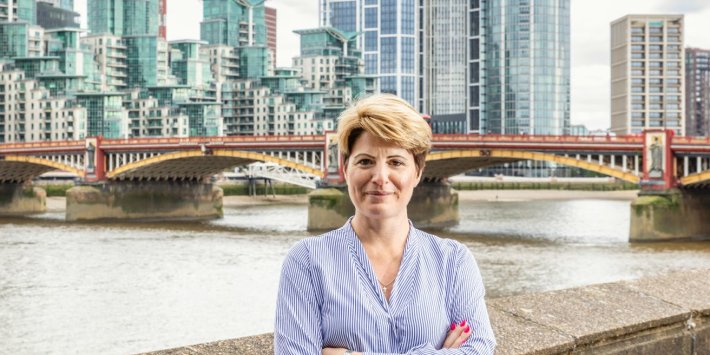
Emma Hardy (Photography by Louise Haywood-Schiefer)
10 min read
With water now a top political issue in Britain, Sienna Rodgers talks to Defra minister Emma Hardy who says regulation of the industry is ‘broken’ – and warns companies, ‘there’s no room to hide’
In the wake of a drubbing at the local elections, Labour MPs are anxious, some angry, and all are looking for something to stem the tide of voter dissatisfaction with their party. For Emma Hardy, the answer can be found in the government’s plans for water.
“How do we win voters’ trust? How do we show them that we’re serious about improving their lives? We’re showing it with what we’re doing with water,” she tells The House.
“I completely understand why people want us to do more and change things more quickly,” Hardy adds. “They want change, and they want it now. Now we’ve got to focus on making sure we deliver.”
The Water (Special Measures) Act, passed in February, banned unfair bonuses and threatened criminal punishment for water executives who cover up illegal sewage spills – not just fines but up to two years in prison. Now the government has announced that 81 criminal investigations into water companies have been launched since July.
“That is an increase of 143 per cent under the previous government. Under the previous government, not one – not one – water boss faced a fine. Not one water boss faced criminal sanctions,” Hardy stresses.
“In fact, there were three people who were prosecuted under Southern Water – and they walked out of court without a fine, without a criminal sanction. They just walked out at the end of it, which is completely unacceptable.”
Hardy, 45, was a primary school teacher for 10 years before she became a full-time education union organiser. From there, she was picked as the Labour candidate for Alan Johnson’s former seat in Hull, and entered Parliament just weeks later in the 2017 snap election.
After a short stint as a shadow education minister, Hardy campaigned on flood prevention – Hull was badly affected by the fatal UK floods in 2007 – and soon rejoined the front bench in a related brief. Today she is the minister for flooding and water.
The House meets Hardy in Millbank’s Riverside Walk Gardens, where we sit on a bench surrounded by pigeons and their droppings. The minister’s gold sandals and hot pink mani-pedi look somewhat out of place in this unglamorous setting.
But the location has been chosen with intent by her team: behind one of Henry Moore’s abstract bronze sculptures is a view of the £5bn Thames ‘super sewer’ that promises to reduce sewage discharges into the river by 95 per cent. The government says it has secured £104bn of private sector investment for water upgrades and this, her aide explains, pointing across the river to the workers in high-vis jackets, is the kind of huge infrastructure project they hope these funds will go towards.
Clean water campaigner and former Undertones singer Feargal Sharkey is critical, however. “You’ve been swindled yet again,” he recently warned consumers, arguing that the £104bn “doesn’t exist, never did” because much of it will come from bills.
So, if the legislation is as effective as ministers claim, why is Sharkey still unhappy?
“Enforcement under the previous government wasn’t serious. People were allowed to get away with things. I’ve got so much respect for Feargal – I think he’s amazing. I completely understand why people are looking at what’s happened previously and almost not believing, but this is why it comes down to delivering what we say we’re going to do. We’re taking this seriously. We had toothless regulation, and we’ve changed that.”
“Sewage wasn’t mentioned once in Reform’s manifesto”
Bill-payers across the country face a 25 per cent increase on average this year. “I honestly don’t blame them for being really furious about it. I’d be furious,” Hardy sympathises. She points to action already taken: “We’ve said the water bill increase can only be spent on infrastructure improvements. It can’t go on bonuses. It can’t go out on shareholders. And if it isn’t spent on infrastructure, it has to be refunded back to the customer.”
The minister emphasises that social tariff support is being doubled, and she is asking water boards how they identify vulnerable customers and sign them up for support. She believes people are understanding – as long as their money goes towards repairs, not shareholders or bonuses.
Promises on infrastructure improvements have been made before but not delivered. “That’s what we’re changing,” she says. “Each month, we’ll look at a dashboard of these projects, and say, ‘Right, your project, where are you on that? Where have you got to on that?’ And have that top level of scrutiny in government so there’s no room to hide.”
Not everyone is satisfied. One Labour backbencher calls the Water (Special Measures) Act a “damp squib” and “polishing a turd”. “This isn’t going to change water,” they conclude.
Critics of the regulators say they have turned a blind eye to corruption because there is a revolving door, with senior employees switching freely between them and the water companies. The government has set up the Cunliffe review, a commission headed by former Bank of England deputy governor Sir Jon Cunliffe, and through this, “We’re looking at resetting the whole regulatory industry,” Hardy says.
Water UK has highlighted that there is significant overlap between Ofwat, the Environment Agency and the Drinking Water Inspectorate. The government has talked about “taking back control” by abolishing quangos such as NHS England. Could the Department for Environment, Food and Rural Affairs (Defra) do its own version by scrapping some of these regulators?
Hardy does not rule it out. “What I will say – I don’t want to pre-empt his recommendations, or what Sir Jon’s going to do – is that we know the regulatory system is broken. Because the proof is in the pudding, isn’t it? If the regulation system wasn’t broken, we wouldn’t be in the situation we are now.”
Those who blame not only the water regulators and companies but also the ownership model complain that the terms of the review are too tightly drawn. Labour MP Clive Lewis, who has a Private Members’ Bill on water, would like to see ministers pursue a mutualised model, with new mayoral strategic authorities taking control on a regional basis.

The government has rejected nationalisation, claiming it would cost £100bn, a figure rejected by others. Asked what she makes of the mutualisation option, Hardy employs a phrase regularly used by ministers in all contexts right now: “The world is where we are, not where we’d like it to be.”
“If we started talking about nationalisation or mutualisation or anything, we could undermine that £104bn of investment that we’ve got coming in in the next five years,” she continues. “If we deliver on that,” the minister promises, “we’ll see sewage overflows decrease by nearly 50 per cent in the next five years”.
“If I start going off on a different tangent, to look at nationalisation, to start getting involved in legal battles… I’ll be fighting with that for years. I won’t actually be doing what people want.”
But can she say whether the initial privatisation, back in 1989, was a mistake? “We are where we are with it. Thatcher did many things that I’m not going to agree with or say I support from a very long time ago.”
Reform UK’s lurch to the left on economics has seen the party back public ownership of water as a naturally monopolistic industry. Some in Labour worry that the right-wing populists are ahead of the government on this issue.
They are also concerned about Reform’s courting of trade union members. The image of Nigel Farage and other Reform figures standing with workers in Scunthorpe, holding “Save Our Steel” signs emblazoned with trade union logos, was particularly striking.
As the MP for Kingston upon Hull West and Haltemprice, the water minister now has a Reform mayor representing her own area. “He’s an Olympic gold medallist, so of course I respect him for that,” is all she has to say about the former boxing champion, Luke Campbell.
“Sewage wasn’t mentioned once in Reform’s manifesto.” Hardy rolls her eyes: “Our entire workers’ rights bill, they voted against. Then they try to pretend they’re on the side of working people.”
Referring to Reform’s warning that any DEI (diversity, equity and inclusion) council officers should look for other work, she continues: “What was their recent announcement? They were going to get rid of people whose jobs don’t actually exist in the Lancashire mayoral authority! I mean, this is not serious. They have never been on the side of working people.”
Reform’s support for public ownership is just “the latest bandwagon”, she adds. “I think Reform say whatever they want to say at a particular time, whichever way the wind is blowing. And they say a lot of things. They forget to say how they’d pay for any of it.”
For Labour MPs, government spending is never far from their thoughts. Thames Water is reportedly headed for a takeover by US private equity firm KKR, and the Treasury has threatened Defra with a £4bn bill if the UK’s largest water company falls into state hands via special administration, according to The Guardian. Rachel Reeves’ department is not a popular one right now, with “Treasury orthodoxy” being disparaged by even loyal Labour MPs. Is it holding her back from doing what needs to be done?
“When it comes to special administration, obviously, that’s decided by the courts. If it comes to special administration, it would be in the case of Thames Water that it becomes insolvent or it’s bankrupt, or it can’t perform its basic duty, so if your water doesn’t come out your taps and your sewage isn’t being taken away. That’s the kind of level needed to reach special administration.
“If special administration were to happen, of course, like any sensible government, we’re prepared for it, but at the moment we’re not in that situation. We’re monitoring it, but in the event of it happening, to reassure people: taps will still work, sewage will still go, people will still get paid and it will continue.”
Defra’s entire budget last year was £4.6bn – is she saying ministers are prepared for that £4bn bill to go on its own books? “I don’t recognise that figure, but I can say, obviously, as any sensible government, we’re preparing for any situation. But at the moment, the company remains stable.”
The House wonders whether Hardy has considered water fluoridation, which is increasingly controversial in the US, with Health secretary Robert F Kennedy Jr urging states to ban it in public drinking water; Utah became the first to do so earlier this year. With the UK’s habit of importing rows from across the pond, does she expect to be making a public health case for fluoride soon?
“It hasn’t landed on my desk yet,” the minister replies, joking: “Maybe the tariffs Trump introduced will reduce some of the things that we’re importing from America.”
Perhaps Hardy has avoided the discourse as she is not on X, having left “a few years ago”. Why? “Because it’s horrible. It was just like, ‘Why am I on this platform?’… I don’t feel like I’ve missed out by leaving Twitter.”
The mum of two prefers Facebook. “My daughter tells me it’s because I’m old,” she laughs. “I’ve been told I’m not allowed to ever get TikTok. I promised my teenage daughter. My daughter’s response was, ‘Mum, I will die.’’”
Hardy suggests to the spad and civil servants around us that they could work on a new TikTok dance video related to her brief, and makes a promise to The House: “If I ever floss at a sewage treatment works, I will give you exclusive rights to the video.”





